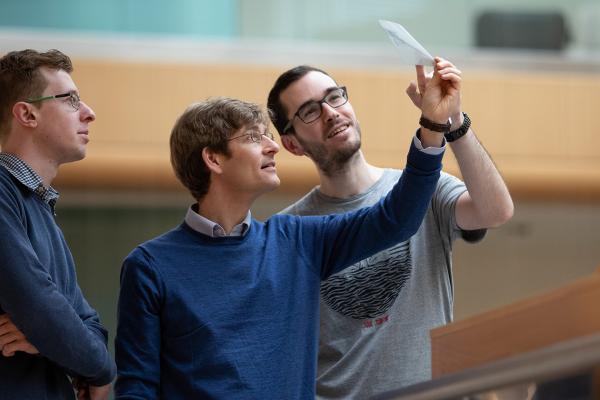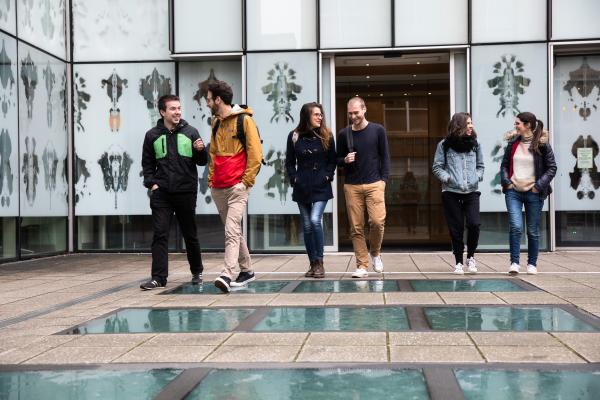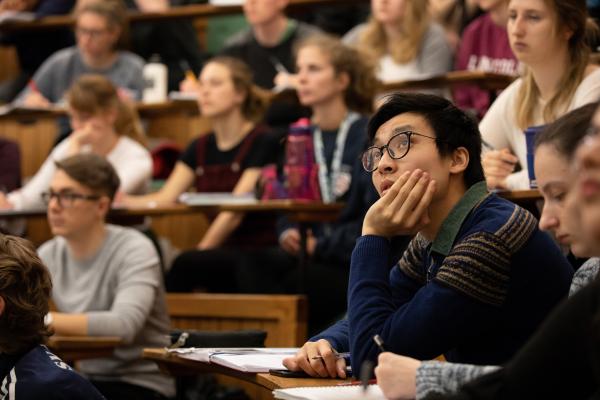About the course
Our ‘Biochemistry (Molecular and Cellular)’ course is a four-
year programme, resulting in graduation with an
M.Biochem - a masters degree.
The M.Biochem degree is a level 7/cycle 2 qualification. Further information on this can be found in the University’s Awards Framework.
The course is designed to reflect the wide range of research we carry out, which means that while we help you gain a thorough understanding of the principles of biochemistry we also introduce you to some of the latest techniques and discoveries in everything from molecular biology and genetics to cell differentiation and immunology in the plant, animal and microbial kingdoms.
During the first three years of your degree your work is divided between lectures (about ten a week), tutorials (one to three a week) and practicals (averaging one full day a week). The rest of your time is spent on private study, like set reading or problem-solving exercises. Your fourth year is very different, with most of the time spent on an extended research project that results in a written dissertation and an oral presentation.
What you'll be studying
Our recently revised course uses a variety of learning methods and assessment to explore biochemistry at its cutting edge. Details of the new course content and structure can be found on Canvas and are summarised here.
In your first year you’ll gain all of the necessary scientific skills and knowledge to prepare you for the more advanced classes you’ll take in your second and third years. It’s essentially a foundation year made up of five courses: Cellular Biochemistry, Molecular Biochemistry, Mechanistic Biochemistry, Physical Biochemistry and Quantitative Biochemistry. At the end of your first year there’s one written paper in each of the five subjects. These are all pass/fail exams and don’t contribute to your final degree result.
During your second and third years you’ll study five key areas of molecular cellular biochemistry - Tool Boxes for Biochemistry, Information Transfer, Molecular Processes in the Cell, Cellular Chemistry and The Cell in Time and Space. These courses are compulsory, but you’ll get to choose specific topics within each of these courses.
Some of the material on the course, particularly the material taught in the toolboxes for biochemistry area, will be assessed by a form of continual assessment held twice a year, in years 2 and 3. These marks will contribute to you final degree result.
At the end of your third year you’ll take seven papers - one for each of remaining four main area of study, one to test your ability to deal with the analysis and interpretation of biochemical data, one to test your ability to read and interpret research papers, and one general paper designed to assess your broader understanding of biochemistry. The results of these exams contribute to your final degree result.
You’ll also be encouraged to organise an internship in the summer break at the end of either your second or third year, which will give you hands-on experience working as part of one of our research groups.
The fourth year is your opportunity to specialise in the area that interests you most. The first and second terms, and most of the third term are dedicated to a 25-week research project where you’ll get to design your own experiments, learn to plan research programmes, and present your results and ideas to other researchers in the field - experience that’s hugely valuable both to a potential employer and for your own reflection on what kind of future career or research you might be interested in.
You’ll do this project alongside an existing research group working in your chosen subject area. The group could be within our own department, or you could choose to work with another department carrying out biochemically related research (such as Chemistry, Pathology, or Clinical Biochemistry). During the last two weeks of the research project you finish writing a short thesis. Once the thesis is submitted, you prepare a 10-minute presentation on the project. These are both examined and make up 25% of your final degree.
Alongside the research project you will write a review article for specialists also in an area of interest to you, with advice from an expert of your choice in this area. This exercise is also hugely valuable to a potential employer. The marks award for the review article also count towards your final degree result.
If you want to find out more details on a specific module, or take a look at current lecture timetables and study resources to get a better feel for the kinds of things you would be learning, you can find all that information in our canvas portal. You can also see our recommended reading list if you want to find out a bit more about biochemistry before you apply.








